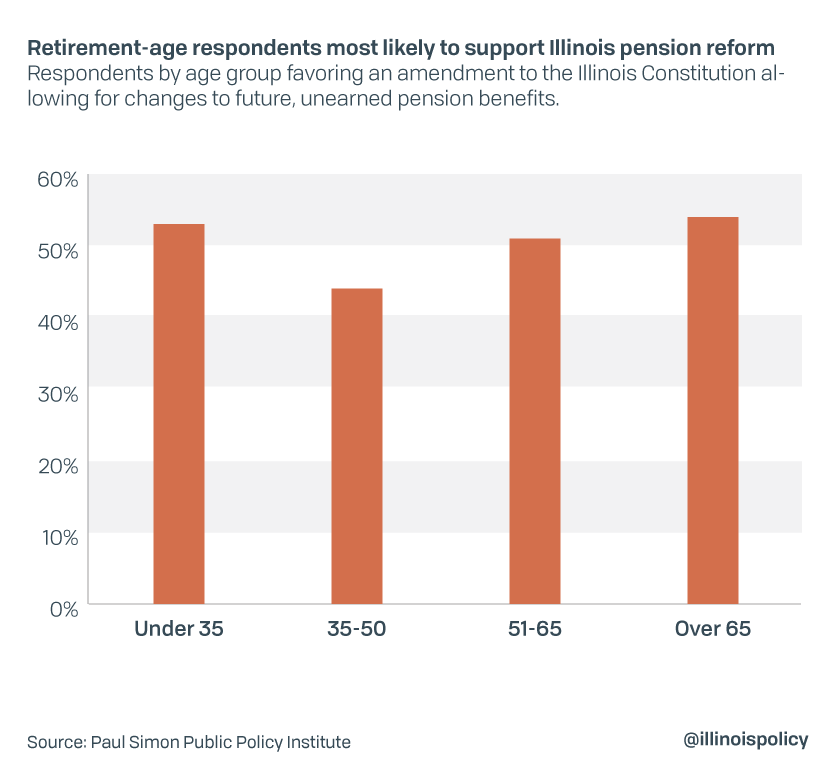Poll shows diverse support for Illinois pension reform
Illinois Democrats, union members, government or nonprofit workers, and people of all income groups support a pension amendment that allows for changes in cost-of-living raises and other future benefits.
A new poll from Southern Illinois University shows broad support for reforming Illinois’ public employee pensions, which despite consuming more than 25% of the state budget continue to grow massive debt.
Researchers from the Paul Simon Public Policy Institute asked 1,000 Illinoisans if they support “an amendment to the Illinois Constitution that would preserve state retirement benefits already earned by public employees, but would also allow a reduction in the benefits earned in the future, whether by current or future employees.”
A constitutional amendment currently in the General Assembly – HJRCA 38 – would do just that. If passed, it would allow for reforms such as later retirement ages and smaller cost-of-living adjustments.
The poll found 51% of Illinoisans said they would support the amendment while only 37% were opposed. In Chicago, 55% of residents believe the amendment is a good idea.
Half of the poll’s respondents were from the suburbs and more than half with a party affiliation were Democrats. The poll’s margin of error is 5%.
Support for a pension amendment outweighed opposition across all three income brackets measured by the pollsters:
- 46% of individuals earning under $50,000 annually support an amendment, while 39% oppose it
- 50% of respondents earning between $50,000 and $100,000 would support amending the constitution
- Of those with incomes over $100,000, 57% showed support for the amendment
Respondents age 66 and older showed the most support at 54%. Their response is especially significant because they are the group most likely to be receiving a pension. The amendment would ensure retired public servants already earning a pension would see no changes to their current benefits, despite what some politicians claim.

When broken out by race, 54% of white respondents and 55% of Hispanics were in support, as were 51% of mixed or other races. Meanwhile, black respondents showed weaker support, with 39% supporting the idea compared with 55% opposing.
Even respondents belonging to labor unions appeared to show support: 47% said they would support the amendment while only 43% were in opposition. That stands in contrast to Illinois’ public employee union leaders, who have refused to make any pension changes. However, Arizona, Minnesota and New Mexico were all recently able to pass pension reform with union support.
Government and nonprofit employees were mostly in support of the amendment, with 49% in favor and 45% opposed.
When breaking it down by party lines, 48% of Democrats also supported the idea of constitutional pension reform, with 41% opposed. Some Democrats, including Gov. J.B. Pritzker, have claimed constitutional pension reform is not possible, calling it a “fantasy” that would violate the U.S. Constitution’s contracts clause. Mark Rosen, a distinguished law professor at Chicago-Kent College of Law, explained why that is wrong in his recent response in Crain’s Chicago Business. Even if a federal court were to rule that unearned future pension benefits are part of a contract with state employees – and it is not certain they would – case law demonstrates contracts can be reasonably changed when necessary to prevent a breakdown in essential purposes of government, such as leaving government unable to fund education, public safety or other core services.
The Illinois Policy Institute’s Illinois Forward plan champions a constitutional amendment on pensions as the main need to fix Illinois finances and stop seemingly endless tax hikes. Former Chicago Mayor Rahm Emanuel and the Chicago Tribune Editorial Board both have expressed support for the pension amendment.
Illinois has the worst pension crisis in the nation. The state estimated the pension debt at $137 billion. However, Moody’s Investors Service calculated it is much higher at $241 billion. Pension spending has grown more than 500% since 2000 while the state has cut services to some of its most vulnerable residents by 32%.
Pensions are driving Illinois’ fiscal crisis, so Illinois lawmakers should approach constitutional pension reform with a sense of urgency. It is clear Illinoisans support reform. Now, lawmakers must act on the will of their constituents.